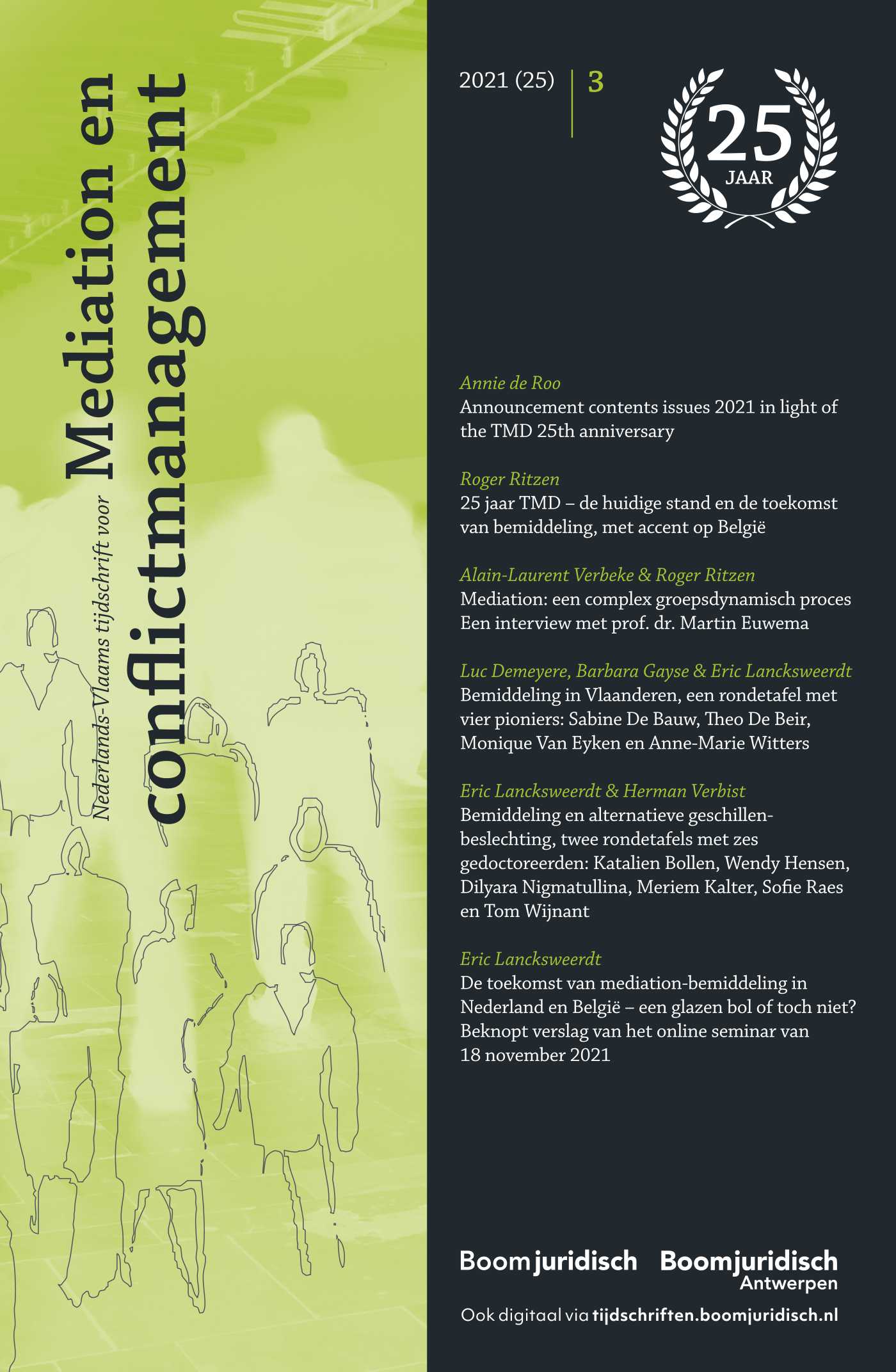|
The Hague Rules on Business and Human Rights Arbitration have been drafted by a working group chaired by Prof. Bruno Simma, former Justice in the ICJ, to offer an international private-judicial alternative in anticipation of a full-fledged system of judicial remedies to complement human rights due diligence as embodied in the UN Guiding Principles on Business and Human Rights (UNGPs). The author discusses the underlying principles of the Hague Rules, and the challenges the working group had to face such as the power imbalance between parties, and the special requirements to be met by arbitrators. The relationship with mediation is also touched upon. |


Nederlands-Vlaams tijdschrift voor mediation en conflictmanagement
Meer op het gebied van Mediation en herstelrecht
Over dit tijdschriftMeld u zich hier aan voor de attendering op dit tijdschrift zodat u direct een mail ontvangt als er een nieuw digitaal nummer is verschenen en u de artikelen online kunt lezen.
| Redactioneel |
Verantwoording dragen voor geschiloplossing en geschilfinanciering |
| Auteurs | Annie de Roo |
| Auteursinformatie |
| Interview |
Langlopende letselschadezaken – wat gaat er mis; wat kan eraan gedaan worden?Interview met Tweede Kamerlid Michiel van Nispen |
| Auteurs | Rob Jagtenberg |
| Auteursinformatie |
| Artikel |
|
| Trefwoorden | business and human rights, UN Guiding Principles on BHR, multistakeholder, private judicial remedies, non-judicial remedies |
| Auteurs | Jan Eijsbouts |
| SamenvattingAuteursinformatie |
| Artikel |
Merging with tradition – Sri Lanka’s pathway to effective mediation practices |
| Trefwoorden | community mediation boards, effective mediation practices, traditional dispute resolution, inclusivity |
| Auteurs | Indika Perera |
| SamenvattingAuteursinformatie |
|
The effective administration of justice in Sri Lanka is challenged by excessive delays in the delivery of people-centred justice services. The increased use of ADR models and approaches, such as Community Mediation Boards reduces the caseloads in the formal court system, providing multiple benefits to litigants and ensuring sustainability of the rule of law and good governance. The increased awareness and acceptance of the ADR mechanisms itself empower local communities and marginalised social groups in dealing with their local disputes in a more cost effective and sustainable manner. |
| Artikel |
The future regulation of third-party funding in EuropeConference Report, 22 June 2022, Erasmus University Rotterdam |
| Trefwoorden | third-party funding, access to justice, litigation costs, regulation |
| Auteurs | Adrian Cordina en Eva Storskrubb |
| SamenvattingAuteursinformatie |
|
The right of access to civil justice continues to be constrained by the cost, complexity and delays of litigation and the decline in public legal aid. Private litigation funding methods like third-party litigation funding (TPLF) have been developing in Europe and other jurisdictions as a result of these challenges. The debate on whether and to what extent TPLF should be regulated has also been gathering pace. On the one hand, proponents of TPLF argue that it facilitates access to civil justice whilst, on the other hand, critics of TPLF say that there may be risks of abuse. These issues were critically discussed at the conference ‘The Future Regulation of Third-Party Funding in Europe’ held on the 22 June 2022, concluding the online seminar series on ‘Trends and Challenges in Costs and Funding of Civil Justice’ organised by the Vici team at Erasmus School of Law. |
|
In addition to conciliation and arbitration, since 1 July 2022, ICSID also offers the possibility of resolving investment disputes through mediation. Along with the introduction of the ICSID Mediation Rules, the ICSID Conciliation Rules were also amended, to make the Conciliation Rules more user-friendly and also more flexible, and to allow parties to use the mechanism of the UNCITRAL Convention on International Settlement Agreements resulting from mediation (‘the Singapore Convention on Mediation’) for enforcement. |
| Signalement |
Grammar of the wealthy familyHealthy Communication and Constructive Conflict Management, A.-L. Verbeke, M.C. Euwema & K. Bollen, The Hague, Eleven, 2022, 137 p. |
| Auteurs | Alain-Laurent Verbeke |
| Auteursinformatie |

